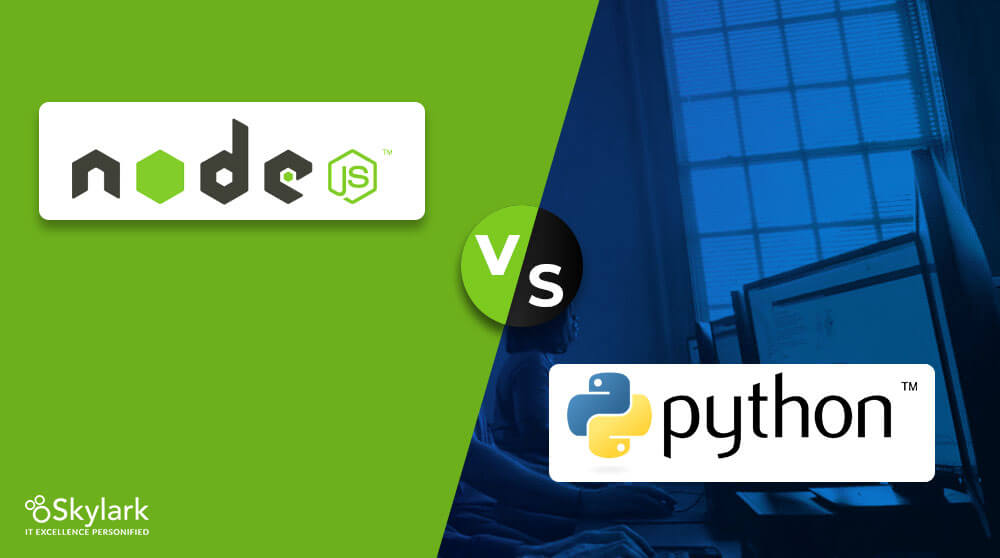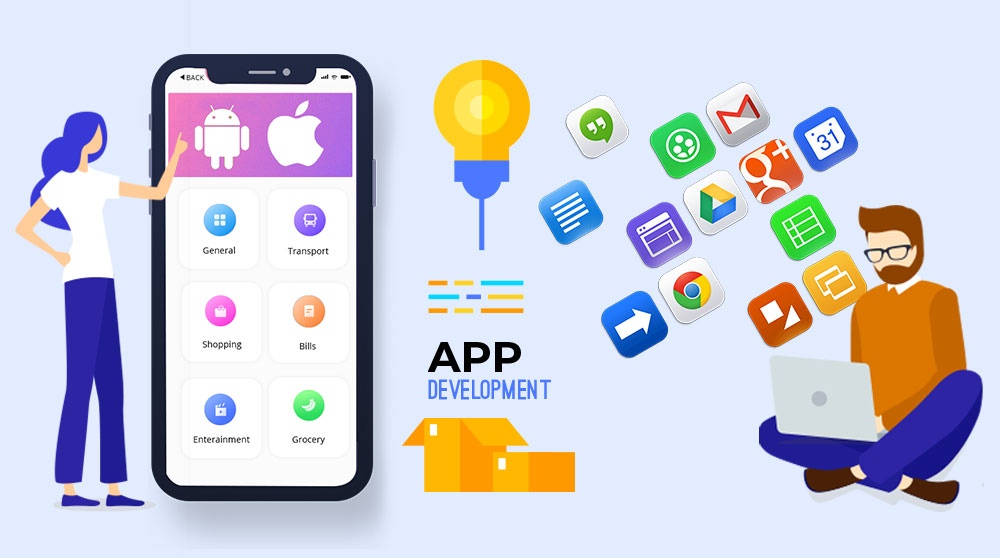
Smartphone technology has reached a whole new level due to the increase in demand for the latest mobile apps to make day-to-day operations convenient and user-friendly. As more volume of the population is shifting to mobile phones for internet surfing and performing small tasks, developing mobile apps in Singapore is at an all-time high. There are apps to perform almost all the functions like shopping, social media, providing information on many topics/fields, etc.
According to Statista, there will be close to 4.82 million smartphone users in the country by 2022. So, are you also planning to build a mobile app in Singapore and looking for a reasonable rate? Then, you have landed on the right page. Let us clarify that app creation in Singapore is cheaper than in the United States, but still, you need to shell out a lot of money to make the app developers work for you. This is one of the reasons that many apps are outsourced from Singapore-based mobile app development firms.
Coming to the price of developing a mobile app worldwide, the companies generally charge on an hourly basis. The average hourly cost of an app starts from as low as $10 and goes up to $250 per hour. India has the lowest price, while North American developers charge the highest.
Relying on several factors, there are different kinds of apps made for certain price tags based on the requirements of the clients. Also, these apps can be made for many different platforms like iOS, Android, Windows, Blackberry, and HTML5.
Below is the list of aspects that vary the cost of application development:
- Type of App
- Designing
- Prototyping
- Complexity
- Platform (iOS, Android, etc.)
- Quality and Speed
- Customization
- Developer Requirement
- Development Time
Mobile App Development Costs Based on App Types
Table of Contents
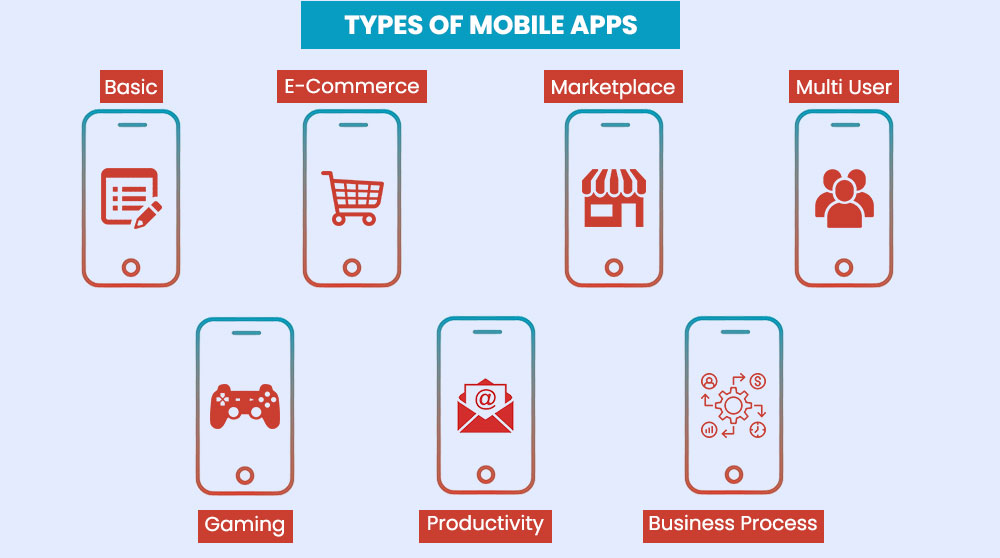
1. Basic Informative Mobile App
A basic app that fetches required static information to the users through a simple hyperlink or button click is the cheapest one you can create. These apps would generally only have a limited number of screens, say 6-10, and would not require any server connection, as all the information that can be shown is downloaded with the app itself. Now, since there is no backend necessary for such simple apps, they can be created in a short period, mostly within a month even.
Also, such basic apps could easily be made in the price bracket of $10,000 to $30,000. This price would include designing and developing perfect UI elements so that the user can get to the required information in no time. However, in case you need something more than just simply showcasing information, you will have to stretch the budget and timeline a bit more, for up to $40,000 and 2 months. In this price range, you can expect your app to fetch data from users and even have the information updated at regular intervals with a steady server connection.
2. E-Commerce or Shopping Mobile Application
With both eCommerce and mobile usage on the rise, shopping apps have become quite popular investments for retail businesses. Having a dedicated eCommerce app has many advantages that range from increased customer loyalty to a more future-forward approach for harnessing a bigger customer base.
In general, the MVP (Minimum Viable Product) of a mobile e-commerce app with basic features like user registration, account management, inventory showcasing, and payment gateway integration can be built within a price range of $15,000 to $50,000 in Singapore, within a timeframe of 3 to 6 months. But in case you need more facilities like user-personalization, dedicated price offers, ability to customize a product, social features, etc., this price and timeline can go up to $65,000 and 9 months, respectively.
3. Unique Marketplace Applications
Marketplace apps are some of the most popular apps in today’s era. These apps combine multiple native mobile functionalities like location sharing, tracking, chats, payment integration, etc., to give a seamless experience to today’s multitasking users. A classic example of a marketplace app is Uber, which combines all the aforementioned features to allow you to hire a cab, contact the driver, share the location, calculate the payment in real-time, and track the entire ride.
These myriads of functionalities make such apps comparatively complex to develop. Therefore, these can be some of the costliest apps you can invest in. The general cost of development for such mobile apps can range between $20,000 to $90,000 in Singapore. Developers can take from 5 to over 9 months for its completion, depending upon the novelty of the features and their respective complexities.
4. Multi-user Mobile Applications
In the age of the internet, multi-user mobile applications have become ubiquitous. The major function of these apps, as clear from the name, is to allow multiple users of the platform to interact with each other. The best examples of such multi-user apps are social networking ones, like Instagram, Twitter, TikTok, and WhatsApp.
Like any classic multi-user application, these allow users to not only interact with each other in real-time via the one-on-one chat functionality but also to share their data with the larger public registered on the said platform. Since these kinds of mobile applications thrive on user-generated content, it becomes doubly important for them to have an exemplary user interface. In fact, these are among the only few mobile apps that can easily get you a better hand over even conglomerate competitors by simply understanding and fulfilling the user requirements better.
With such a massive focus on UX and the complexity of features, the development cost of these apps starts from $40,000 and can go up to $1,00,000. Depending upon the elements, these apps can be developed either in a short span of 3 months or can stretch up to cover even more than 9 months.
5. Mobile Game Applications
The mobile gaming industry, with one of the highest CAGR rates, is predicted to grow up to US$ 287.1 Billion by 2026. With such a significant return on the horizon, the development cost of mobile game apps is easily expected to be at the higher end of the spectrum. But higher returns aren’t the only reason why these apps are so costly to develop. The fact is mobile games are among the most challenging apps to build.
From storyboard creation to animation, and from concept art to highly complex programming, developing a mobile gaming app includes expertise in varied areas and thus is bound to cost the most. This being said, not all gaming apps can cost you a fortune. If you want a simple 2-dimensional mobile app, you can easily have it developed between $80,000 to $1,50,000 of cost, well within the timeline of 3 months.
However, for a more complex 3D game, with elements like augmented reality, and virtual reality at play, you are looking towards an investment of around $1,50,000 to $5,00,000 in the Lion city, with a development timeline that can stretch up to 8 months.
6. User Productivity Mobile Applications
With mobile phones becoming the omnipresent device of the era, owned by almost every adult, the demand for user productivity management apps has increased a lot. Professionals willing to be on the go all the time need productivity apps like Email, Dropbox, and Evernote on their smartphones to manage their work from every place.
Since these apps are mainly required to be connected with a dedicated server, intensive and reliable backend becomes their quintessential functionality. With limited and pre-defined user functions and seamless synchronization facilitation, these apps can cost anywhere from $15,000 to $30,000 to develop within a timeframe of 1 to 3 months.
7. Business Process Management Applications
Business process mobile applications are extensively used by commercial organizations for efficient streamlining for automated processes. The function of these apps is to reduce the workload of management teams by allowing them to monitor and regulate various functions effortlessly. CRMs or Customer Relationship Management applications are classic examples of such apps.
These apps can be highly specialized or can be built to manage different aspects of a business all at one end. Since management itself is usually highly specialized, the functionalities and cost of development for these apps can also vary depending on the job it is required to facilitate. Major workforce management apps are developed within the price range of $20,000 to $60,000. In contrast, a management app with logistics, customer relationship management, and HR management can be developed for anything between $20,000 to $50,000.
Similarly, an app as a service for documents and accounts management can easily be made for $50,000, cost increasing up to $1,50,000 for extensive customized requirements. Since functionalities of these apps vary a lot, their timeline does too, starting from 3 months to over 10 months in case the requirements are co-dependent and complex.
Mobile Application Charges Based on Development Time
Now, since we’re aware of how the type and complexity of an app can define its development cost, let’s also see how these complexities affect the development cost by imputing the time factor. In general, if an app takes more time to develop, more resources would be required to work on it for a longer time. Even though methodologies like Agile can help you bring specific efficiency into the picture, it alone might not help much unless you understand how important a role time plays in deciding the overall cost of development.
How much does 1 month of app development cost?
This is the best question you can ask while deciding on a mobile app budget while analyzing its specifications. A basic app can well be developed in a month, making it a good benchmark while understanding the time factor. Usually, for a reasonably simple dynamic mobile app, you would require a team of 2 developers, 1 scrum master, and in case there are some complexities involved, 1 quality analyst.
Now, considering the average hiring cost of an experienced mobile app developer in Singapore being $60, and one developer working 35 hours per week for one month, you’ll have to pay approximately $16,800 for the developers for one month’s worth of work. Similarly, for a Scrum Master, whose average hourly rate in the Lion city would be $55, you’ll be paying $2,310. Furthermore, if your app is complex enough to make the hiring of a QA essential, you’ll be paying an additional $4,400.
| Approximate Mobile App Development Cost for 1 Month | ||||
|---|---|---|---|---|
| Role | Team Count | Hours Working | Hourly Rates | Amount |
| App Developer | 2 | 280 | $60 | $16,800 |
| Scrum Master | 1 | 42 | $55 | $2,310 |
| Quality Analyst | 1 | 80 | $55 | $4,400 |
| Sum | $23,510 | |||
So as you can see, in total, any good app worth its presence will cost you around $23,510 per month. We can further strengthen the estimation to calculate overall cost by factoring in the average amount of time taken to build different scales of apps.
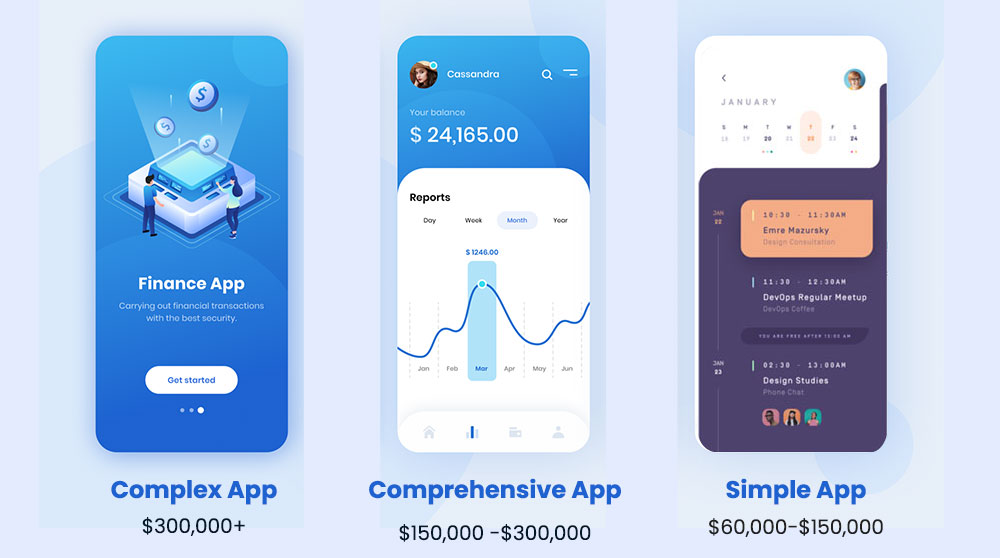
| App Scale | Timeline | Total Cost |
|---|---|---|
| Simple functional app with standard specifications | 3-5 months | $60,000-$150,000 |
| Comprehensive app more custom features and design | 4-9 months | $150,000 -$300,000 |
| Large project for 2+ platforms and complex integration | 9+ months | $300,000+ |
Mobile App Development Costs Based on Platform Types
With all these ranges defined for app development cost, we can see that even the vague idea of complexity and the knowledge of the type of mobile app aren’t enough in making a clear decision on a budget of the same. This is because not all mobile applications run on all mobile platforms. Some do, but then they don’t function as well, while others don’t, making it imperative for you to have distinct versions of your app made for different mobile phones.
Hybrid vs. Native Apps
Most new investors tend to overlook one major factor, i.e., the type of platform they want their mobile app to run on. They can save loads of resources, money, and time only if they pay due diligence on the platform preferences of their target audience.
In mobile applications, these platforms are majorly divided between two broad categories: Native, where the app is developed on the specific guidelines of the targeted operating system, be it Android or iOS, and Hybrid, aka cross-platform, the app that works on multiple operating systems but not necessarily using most in-built functionalities to facilitate better performance.
This being said, a cross-platform application, since it targets a larger audience with fewer development resources, is always a more cost-effective choice, given your requirements aren’t complex and they don’t rely on the native functionalities of a given platform.
Android vs. iOS
If your target audience is majorly limited to one platform only, or the complexities of the app really hamper its performance if not using the native libraries, then it’s clear a native app is the best choice for you. Among native apps, Android and iOS apps constitute about 99.18% of the total global market share, making them the obvious choices for almost all mobile app development projects.
Among these two, the development cost and timeline don’t vary anymore. Thanks to the parent companies of both the mobile operating systems, there are genuinely sturdy IDEs available for both iOS and Android app development that allow developers to create the desired app as efficiently as possible.
Reduce App Development Costs
With all factors known, you can now just easily decide on a budget for your dream app. However, what if we say there are certain tricks, rather good practices that can further bring down the development cost, regardless of all the different factors? Let’s find out.
1. Clear Picture of Mobile App Functions
Just like knowing the preference of your target audience in terms of the operating system, knowing exactly what all your app can do beforehand can also save you loads of resources, time, and money. With Agile Scrum methodology, used by almost all the reliable development teams, you’re not required to plan the entire features beforehand.
However, having a clear vision of what your app is trying to accomplish will help you and the team decide on a technology stack much earlier in the requirement analysis process, saving your money as well as time which otherwise would have gone to drain while trying and testing unbaked and unnecessary features. In case you’re still a little confused on the type of app you would want to have developed first, let’s try first with the ones that are currently most profitable.
Most Popular Types of Apps – Global
While discussing the cost of the mobile app development, the expected returns become the next most inevitable question for any business.
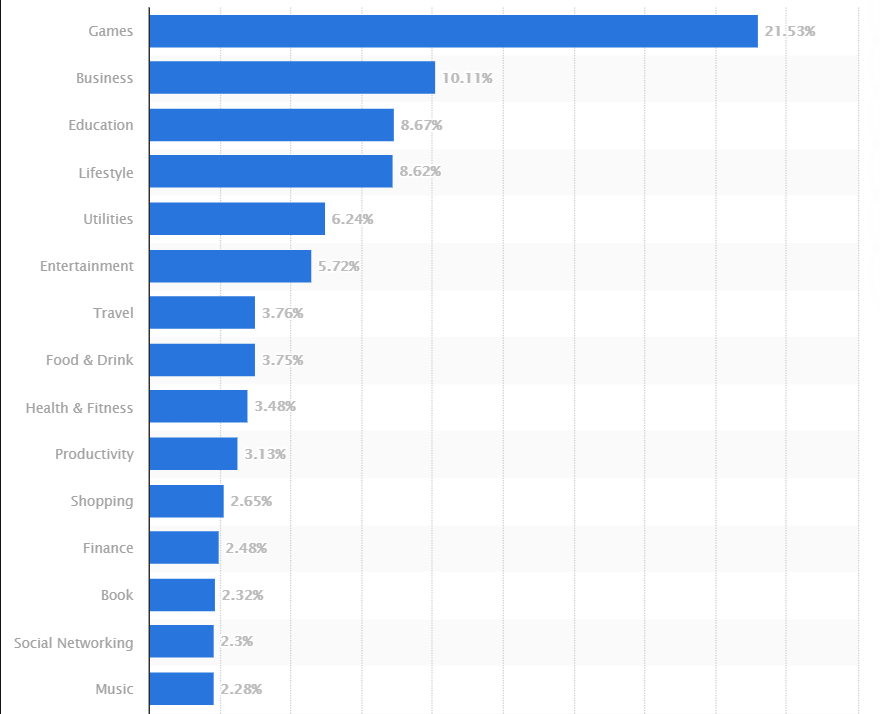
Most popular Google Play Store Categories – 2021
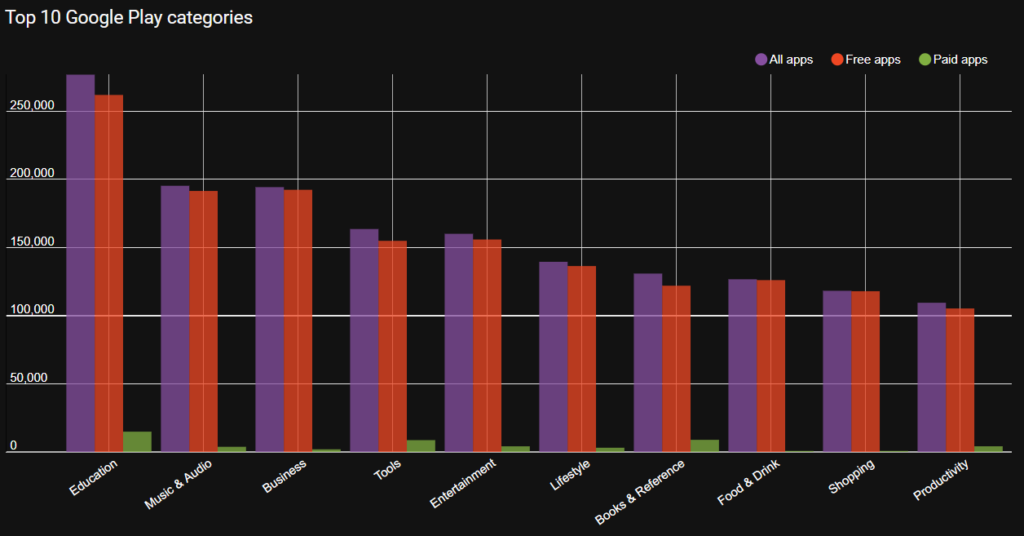
With these statistics, you can easily decide which of the apps may prove to be a better investment for you in the recent future. With the app market growing ceaselessly, the returns in any well-thought-out mobile application are going to be far great. So if you have decided to go ahead with your app idea, make sure you do so without compromising on the quality. This means you would not confuse the potential users with unrelated functionalities and stick to the one category you want to work on.
2. Quality Assurance from Early Stages
One of the major drawbacks projects face when they do not involve QA in the early stages of development and design is the accumulation of easily avoidable bugs that eventually snowball into bigger code dependency issues. This leads to inevitable more retrospective work, delaying the actual progress of the project, or more hiring to keep up with the stipulated timeline. So the best thing you can do to ensure a more cost-effective and smooth progression of your project is to have a QA in the team right from the start who can identify serious problems even before the actual development begins.
Outsource Mobile App Development

With specialization at its core, outsourcing has become the primary source for cost reduction in mobile app development projects. Companies already working in mobile app development will definitely have more experience dealing with all the varied aspects of the process. What more? Since these companies have most likely already developed many similar mobile apps before, they may even have set templates to hasten up the entire process, all the while saving you money.
If you hire an outsourcing company from lower development cost countries like Singapore or India, the sheer difference in currency value will save you a fortune. Compare that to an in-house team, which would require your constant supervision and unnecessary overheads owing to the lack of experience. This approach is only suggestible for businesses looking towards creating many apps over a long time. Thus having an in-house team can pay off in the longer run.
However, if you’re looking to have only a couple of mobile applications and need to market them soon to beat the competition, outsourcing becomes a clear choice.
FAQs – Mobile App Development Cost
How long does it take to develop an app?
The timeline of your app depends on various factors, not the least being how well thought out it is. If you already have an MVP ready for your app and only need to have certain features added to it before taking it to the market, it will definitely take much less time. However, if you haven’t even validated your app idea with a business analyst or even an individual developer, then it will take way too long even to confirm the exact requirement of the same.
Though if you choose a company or hire a team with the best methodologies in place, much of the time can still be salvaged. In the end, the exact timeline will always depend on the complexity of the app. For a simple information app taking at most a month to a business mobile application that can take over 10 months. There is no specific timeline that can be ascertained before clearing out all the app requirements.
Is a mobile website the same as a mobile app?
No, a mobile website is just a better version of a responsive website. They, unlike mobile apps, run on mobile internet browsers and only occupy the cache memory of the mobile phone. Compared to a mobile app, with its execution environment and individual interface, it is more native to your phone and mostly will also be available in offline mode.
A bridge between the two is a web app that uses a browser and an active internet connection to access the information and functionality. However, they tend to have a slightly different and more native feel than a mobile application. If you have a well-maintained website that you only want to have an aperture of sort for your mobile users, then these instead would be a better choice for you. For more information, feel free to drop us a line at info@skylark.com.sg.
Should my mobile app be native or hybrid?
It generally depends on your requirements and budget. In case you have a limited budget but want to reach out to a greater part of the audience, and also the app functionality is not complex enough to require the native libraries, then hybrid apps would prove to be a more prudent investment. However, if any given conditions are not there, it is suggested to have a native mobile app instead.
How can I earn from my mobile app?
There are various ways through which you can convert your app into a steady source for your business. These include:
- In-app purchases
- In-app advertisements
- Upselling products and services
- Sponsorship
- Paid apps
Will the app company offer a server for my dynamic app?
It varies from company to company. Some mobile app development companies do offer servers for running your app at subscription-based charges. However, most companies would only provide you with the development services. You can, however, just as easily take the backend services for your mobile app from the dedicated service providers. Their specialization will also assist you in maintaining better uptime and separate deployment touchpoint with your preferred configurations.
Is it better to take design and development services from the same company?
Generally speaking, you should have an entire team hired from the same company. It will save you much overhead from becoming the bridge between two separate teams geographically located as far from you as from themselves even. From communications issues to management hindrances, having a single source for the entire development process is always an easier option.
How much budget should I retain for app maintenance?
Generally, maintenance charges of an app cost around 35% of its total development budget. That being said, maintenance costs will vary based on the complexities of the app, server requirements, and the location of the IT company. To ascertain this, you may have to connect the base with all the IT companies offering such services and then shortlist them.
How much will Play Store and App Store charge to showcase my app?
Both Apple and Google can decide to renew their policies at any time regarding the showcasing of any app. That is why it is always better to check with their official sources. To date, however, Google Play Store only charges a one-time registration fee of $25. Once registered, you can showcase as many apps as you want, depending upon the company’s selection criteria.
In comparison, Apple charges an annual fee of $99 to $299 for its developer’s and enterprise membership program that allows you to showcase your app on the App Store, once approved by the committee.
Conclusion: Build a Lucrative App at Reasonable Price
With all the factors known to contribute to making a mobile app and its development cost and all the best methods understood to further bring it down, it’s time to begin the journey of your dream app.
Ideally, you should be looking for a reliable mobile app development outsourcing company from the countries known for their competitive development costs and trustworthy outputs. Once that’s done, discuss your target audience and their preferences with the candidate team. You may also want to brief out the features you’re looking for and then gauge their experience to put the gavel down finally.
In case you think Skylark, with its team of 20+ experienced mobile app developers having experience of developing 100+ highly successful mobile applications, can be an excellent team to bring your dream to fruition, contact us now!
Hire Skylark as your Trusted Mobile App Development Partner
Being a leading mobile application development company in Singapore, Skylark has aced the entire dynamic of the development process, making it easy for us to create your desired app within your exact budget. We do it without compromising on quality by employing the best practices of the Agile framework. From requirement analysis to deployment, our team will consistently stay in touch with you to ensure each iteration gives more accurate increments that meet your requirements to a T.
The primary reason we’re able to do that is that we have some of the most experienced developers in all the major technologies. They are acutely aware of the possible pain points of users and are well-versed in the best practices of optimizing user experience. They employ these best practices right from the first sprint and ensure that even the first deliverable is of optimum usability. This way, you beat the competition with each iteration, getting returns on your investment even before all the specifications are designed.
What makes this process even more valuable is that we work with the most reliable technology stack. From using powerful IDEs like Xcode and Android Studio for native apps, and Flutter and React Native for cross-platform ones to creating a marvelous UI (User Interface) with UIKit, Maven, Jetpack Compose, and Ionic, we ensure that whenever we build an app for our client, it remains timeless and ahead of the curve for the longest time in future.
Not only this, having ample experience in using these cutting edge technologies, we ensure that whenever you’re ready to scale the functionalities of your mobile app, our team can just as quickly get on board in deploying the newer features without losing any time.
